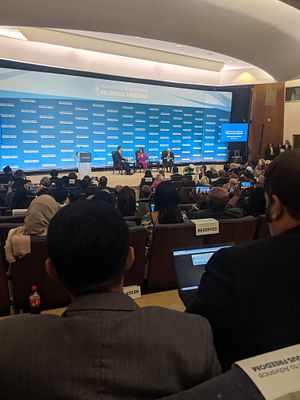The United States risks losing moral authority to speak up anywhere, Speaker of the House of Representative Nancy Pelosi commented at the Ministerial to Advance Religious Freedom convening this week in Washington, DC, if it does not challenge China now about the treatment of Uyghurs in Xinjiang.
“The violations [in Xinjiang] are of such scale, are so big, and the commercial interests are so significant that it sometimes tempers our values in terms of how we should act,” Pelosi said. “Unless we are willing to speak out against the violations of religious freedom in China we lose all moral authority to talk about it any other place in the world.”
Pelosi called for Chen Quanguo, currently the Communist Party Secretary in Xinjiang and the architect of the campaign in Xinjiang case by the Chinese authorities as a counterterrorism program, to be sanctioned under the Global Magnitsky Act.
The United States has been selectively critical of China under the administration of Donald Trump. While criticism was loud in the halls of the State Department this week, it has been more muted in the executive branch. In May, before the ongoing trade talks between the U.S. and China turned sour, the New York Times reported that the administration had “backed away” from sanctioning Chinese officials and companies over Xinjiang. As Shannon Tiezzi noted in The Diplomat this week about the back and forth on the trade negotiation front:
There was a push to impose sanctions under the Global Magnitsky Act, but while the State Department and National Security Council were on board, the Treasury Department – ultimately responsible for applying sanctions – declined to move forward. Apparently criticizing China’s practices in Xinjiang was seen as “an impediment” to a possible trade deal. That appears to still be the case, as the United States was notably absent from a group of 22 countries that joined together to express concern about China’s human rights violations in Xinjiang earlier this month.
Pelosi’s comments seem to suggest that Democrats may try to push for sanctions, at least of Chen, setting up a dilemma for Republicans in the Senate and the White House: Allow sanctions to go ahead, likely to tank further progress on the trade front, or as Pelosi herself noted “temper” their values and be seen as siding with Beijing.
Pelosi shared the stage with Frank Wolf, retired Republican representative and a long-time strident critic of China’s human rights record, moderated by Sam Brownback, the U.S. Ambassador-at-Large for International Religious Freedom.
Both Pelosi and Wolf spoke about Tibet, a trial ground for many of the policies and technologies currently in place in Xinjiang, and about Chen’s culpability.
Pelosi noted that Chen’s appearance in Tibet and then Xinjiang wasn’t an accident.
“We know he was appointed for a purpose. He was sent to Tibet for a purpose: to repress. And then he was sent to repress the Uyghurs,” Pelosi said of Chen before again calling for accountability.
“What [Chen] did in Tibet was basically cultural genocide,” Wolf said.
Pelosi, Wolf, and Brownback took the stage just after the daughter of renowned Uyghur scholar Ilham Tohti, Jewher, offered strident remarks challenges China on its treatment of the Muslim minority group. Tohti, who was detained in 2013 and remains in a Chinese prison, serves as a reminder that Chinese targeting of Uyghurs pre-dates the now notorious camps in Xinjiang.
Jewher had ended her remarks with a call for China to release those imprisoned in Xinjiang and perhaps use its wide array if technology to better inform people about their family members’ whereabouts.. She specifically highlighted the 2022 Olympics, which Beijing is scheduled to host, as a point on which to focus: “Is China really qualified to host the 2022 Winter Olympics before all the Uyghurs are liberated from the re-education camps?”
In 2008, as Beijing was gearing up to host its first Olympic Games there were calls to boycott over various human rights issues — including Chinese refusal to condemn the Sudanese government’s actions in Darfur and Chinese policies in Tibet. No large-scale boycott occurred.
Jewher ended with a challenge that went to the core of the global dilemma and inaction on the Xinjiang issue — and a question for China.
“Will individuals and every single country continue to allow your hope for monetary gain and fear of retribution to silence your countries’ actions? I will not be silent. Will you continue to allow China to silence your actions?”
“I have one more question, for China: Dear China, you are so strong — but why are you so scared to let people have their own beliefs or even to know the outside world? Is this really about extremism or is this really about control and power?”

































